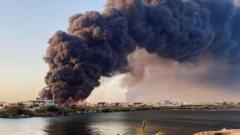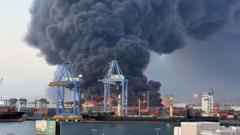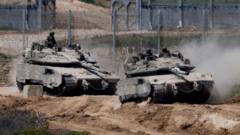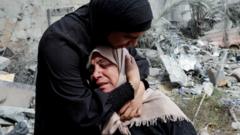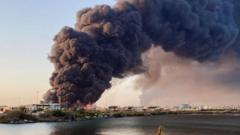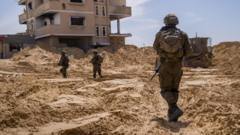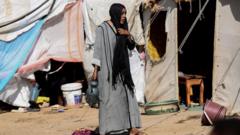The Sudanese military has reportedly employed chemical weapons in its conflict with the Rapid Support Forces, raising international concerns as the U.S. gears up to impose sanctions on military leadership for various wartime atrocities.**
Chemical Weapons Allegations Escalate Sudan's Ongoing Civil War Crisis**

Chemical Weapons Allegations Escalate Sudan's Ongoing Civil War Crisis**
U.S. officials confirm Sudanese military's use of chemical weapons against paramilitary forces while preparing sanctions against military chief amid ongoing humanitarian catastrophe.**
In a shocking development amidst Sudan’s enduring civil conflict, U.S. officials have confirmed that the Sudanese military utilized chemical weapons against the paramilitary group, the Rapid Support Forces (R.S.F.), on at least two separate occasions. According to four senior officials, these weapons were discharged in remote locations as part of the military's strategy since the onset of fighting in April 2023.
Authorities express concern regarding the potential escalation of chemical weapon use in populated urban centers, particularly the capital, Khartoum, which has already faced significant humanitarian challenges. The urgency of these reports comes simultaneously with the United States preparing to impose sanctions on General Abdel Fattah al-Burhan, the leader of the Sudanese military, based on documented atrocities including systematic bombing of civilian areas and employing starvation as a combat tactic.
The deployment of chemical weapons marks a grave intensification of the conflict that has led to what many humanitarian organizations label as the world's worst crisis, resulting in approximately 150,000 fatalities, over 11 million displaced individuals, and unprecedented famine conditions.
In their coordinated actions, the United States has informed various humanitarian agencies and allied nations regarding the imminent sanctions aimed at General al-Burhan, whose leadership is increasingly viewed as representative of Sudan on the international stage, including in forums like the United Nations.
Aid organizations are apprehensive that such sanctions might provoke further retaliatory measures from Sudan's military, potentially exacerbating the humanitarian situation in areas on the brink of famine or already experiencing severe food shortages.
Details regarding the specific types of chemical agents employed remain ambiguous, with knowledge believed to be confined within a small circle of Sudan's military. Nonetheless, U.S. sources assert that there is a clear directive from General al-Burhan authorizing their use.
Further compounding the situation, the U.S. government recently characterized the actions of the Rapid Support Forces as genocidal, leading to sanctions being levied against Lt. Gen. Mohamed Hamdan, the R.S.F. leader, as well as several companies in the U.A.E. connected to arms and gold trafficking for the R.S.F.
As these developments unfold, the international community’s focus sharpens on not only the immediate consequences for Sudan but also the broader implications for regional stability and human rights observance in conflict zones.
Authorities express concern regarding the potential escalation of chemical weapon use in populated urban centers, particularly the capital, Khartoum, which has already faced significant humanitarian challenges. The urgency of these reports comes simultaneously with the United States preparing to impose sanctions on General Abdel Fattah al-Burhan, the leader of the Sudanese military, based on documented atrocities including systematic bombing of civilian areas and employing starvation as a combat tactic.
The deployment of chemical weapons marks a grave intensification of the conflict that has led to what many humanitarian organizations label as the world's worst crisis, resulting in approximately 150,000 fatalities, over 11 million displaced individuals, and unprecedented famine conditions.
In their coordinated actions, the United States has informed various humanitarian agencies and allied nations regarding the imminent sanctions aimed at General al-Burhan, whose leadership is increasingly viewed as representative of Sudan on the international stage, including in forums like the United Nations.
Aid organizations are apprehensive that such sanctions might provoke further retaliatory measures from Sudan's military, potentially exacerbating the humanitarian situation in areas on the brink of famine or already experiencing severe food shortages.
Details regarding the specific types of chemical agents employed remain ambiguous, with knowledge believed to be confined within a small circle of Sudan's military. Nonetheless, U.S. sources assert that there is a clear directive from General al-Burhan authorizing their use.
Further compounding the situation, the U.S. government recently characterized the actions of the Rapid Support Forces as genocidal, leading to sanctions being levied against Lt. Gen. Mohamed Hamdan, the R.S.F. leader, as well as several companies in the U.A.E. connected to arms and gold trafficking for the R.S.F.
As these developments unfold, the international community’s focus sharpens on not only the immediate consequences for Sudan but also the broader implications for regional stability and human rights observance in conflict zones.





